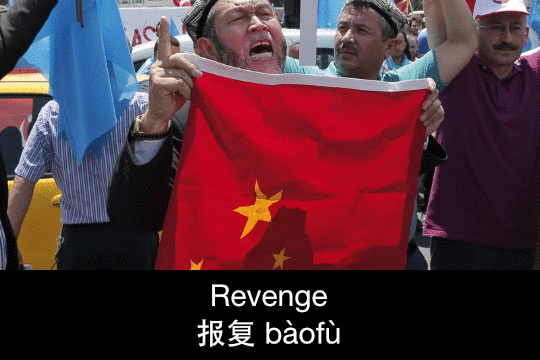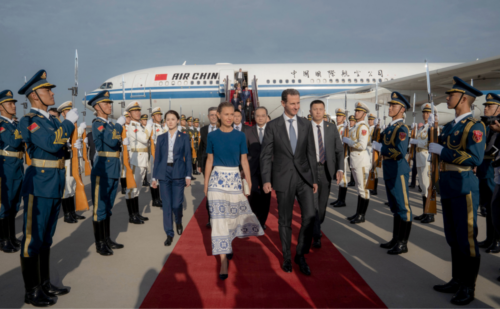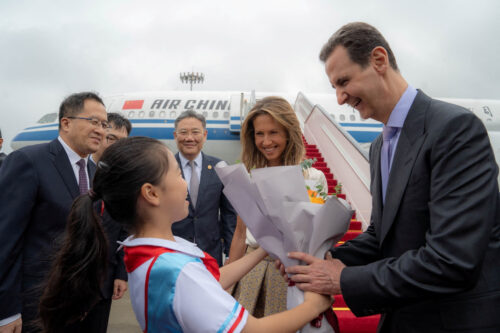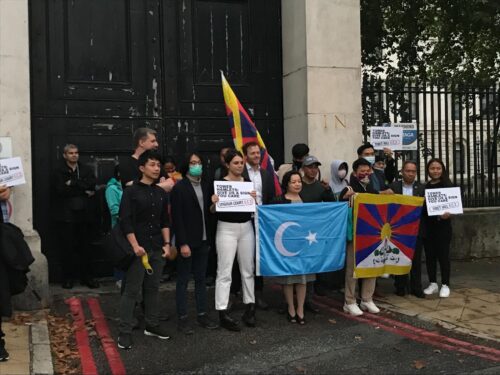Uyghurs in Syria want revenge, not holy war?

Are China’s Uyghurs involved in global jihadi terrorism? The question is highly politicized.
Western critics say the Chinese government hypes the threat of Uyghur Islamic extremists and separatists to justify harsh crackdowns on civil liberties such as invasive surveillance — see recent articles by the Wall Street Journal (paywall), the Associated Press, and BuzzFeed.
On the other hand, what, exactly, is not “terrorism” about incidents like the attack in Urumqi in May 2014 when armed assailants drove SUVs into a street market, mowing down shoppers as they threw bombs out of the car windows? However, there is no clear connection between such incidents of domestic terrorism and international Islamic extremism — the perpetrators seem to be Uyghurs disgruntled by the Chinese government, not global jihadis. Much of what we know about Uyghur involvement with Islamist groups in other countries comes from Chinese government statements, rumors, and internet videos of unknown origin.
But we know a little more now: Gerry Shih of the Associated Press interviewed nine Uyghurs “who had left China to train and fight in Syria” with al-Qaida and the Islamic State. He found that the men did not “neatly fit the profile of foreign fighters answering the call of jihad.” Some key takeaways:
- Uyghur exiles say more than 10,000 of them fled China in 2013 in response to growing repression in China (there are 10 million to 15 million Uyghurs living in China in total). Thousands of them ended up in Syria, fighting alongside jihadists, and “playing key roles in several battles.”
- Most Uyghurs interviewed for the article “knew little about political Islam that fueled jihadis in other countries, and none said they met with recruiters inside China.”
- “We didn’t care how the fighting went or who Assad was. We just wanted to learn how to use the weapons and then go back to China,” said one Uyghur fighter. Another told the AP that he just wanted to learn how to use weapons and then return to China to “liberate” his friends and family. “I’ll get revenge,” he said.
- More than 100,000 yuan ($15,000) is what the same man paid to human smugglers to guide him from China through Laos, Cambodia, Thailand, and Malaysia, “where he received a Turkish travel document.” In Istanbul, he was recruited to fight in Syria.
- The Uyghurs in Syria “don’t enforce an Islamic court system,” and have “a reputation for administering their territory with a light touch,” according to a source quoted by the article.
- Israel and the Zionist movement are improbable sources of inspiration for the Uyghurs: One fighter told the Associated Press that they “studied how the Jews built their country.”
- Many of the fighters are tired of the war in Syria: “We haven’t fired a bullet against our enemy, China… We always fight alongside international terrorists,” said one militant.
Sadly, the vicious cycle of repression, resentment, and violence is unlikely to end soon. The extreme security measures in Xinjiang itself may keep terrorist attacks to a minimum. But the AP article suggests that soft targets in foreign countries, especially Chinese assets along the Belt and Road, might be in the sights of Uyghur fighters, who have been hardened by years of war in Syria.
Two things worth thinking about this weekend
AUSTRALIA CHINA TIFF
- We’ve been covering the growing tensions between Australia and China.
- Naturally, the Global Times, the nationalistic tabloid owned by the People’s Daily, has weighed in with some strong opinions, such as this Chinese piece titled “Confused Australia, China has no duty to lose our heads with you,” or this English-language op-ed “China-Australia ties ebb as populism spreads.”
- The Global Times is often the voice of the Party’s id, even though it certainly is not the official or authoritative voice of the Party. It also represents the views of many ordinary Chinese, too — it is one of the country’s best-selling newspapers and most popular news websites.
- “Even if the Australian government refuses to stop anti-China propaganda, China’s response should start from the private sector, which can serve as a hint to Australia, and would make it easier to control negative impacts,” says a researcher at a state-backed think tank quoted by the Global Times. This is the type of signal seen in Chinese media as the commercial pressure that was ratcheted up on South Korea earlier this year.
THE WAR FOR 5G
China’s telecom regulator said in June that the country’s 5G (fifth-generation) mobile phone network, already being rolled out, would contribute nearly $1 trillion to the economy, create 8 million jobs, and result in a “massive spending spree” that will “begin in earnest in 2020 when carriers and individual enterprises are expected to spend 274 billion yuan [$40.3 billion].”
- People in Washington and Brussels have noticed. Thomas J. Duesterberg, senior fellow at the conservative Hudson Institute, says 4G “was crucial to development of new apps and related services such as Uber and Airbnb,” and suggests that Google and Apple owe their dominance over “the mobile ecosphere” to America’s leadership in 4G development.
- Duesterberg’s concerns are that if China develops core 5G standards, “equipment manufacturers will have to license them on Chinese terms,” which will give Chinese companies the upper hand in the market and bring privacy and security problems.
- His solution: European and American companies and governments should work together to encourage the development of 5G technologies, while using multilateral institutions such as NATO and WTO to rein in Chinese government subsidies, IPR violations, and security threats.
JOB AD: Schwarzman Scholars seeks academic officer
With a $550 million endowment, Schwarzman Scholars supports up to 200 scholars annually from the U.S., China, and around the world for a one-year master’s degree program at Tsinghua University in Beijing, one of China’s most prestigious universities and an indispensable base for the country’s science and technology research. Schwarzman Scholars is looking for an academic officer based in New York.
Happy holidays
All of us at The China Project wish you all the best for the new year and for a happy holiday season, whatever you celebrate. We won’t send a newsletter on December 25 and January 1, and will keep our emails short for the duration unless there is breaking news of significance.
Thanks for your support this year. We look forward to entertaining and informing you even more in 2018.






